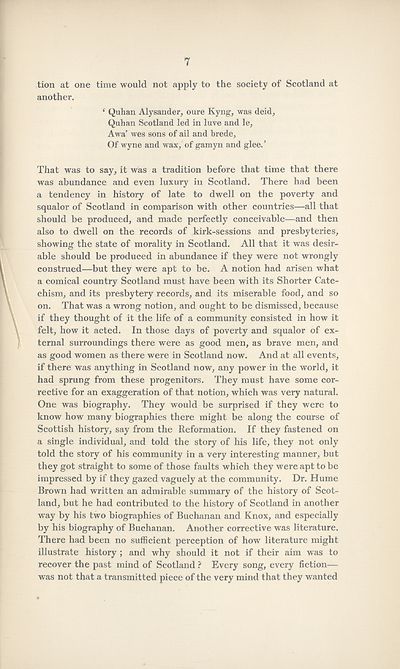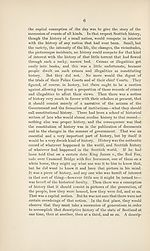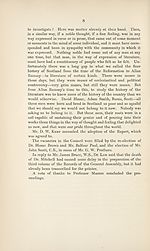Series 1 > Journals of Sir John Lauder, Lord Fountainhall, with his observations on public affairs and other memoranda, 1665-1676
(414) Page 7
Download files
Complete book:
Individual page:
Thumbnail gallery: Grid view | List view

7
tion at one time would not apply to the society of Scotland at
another.
‘ Quhan Alysander, cure Kyng, was deid,
Quhan Scotland led in luve and le,
Awa’ wes sons of ail and brede.
Of wyne and wax/ of gamyn and glee.’
That was to say, it was a tradition before that time that there
was abundance and even luxury in Scotland. There had been
a tendency in history of late to dwell on the poverty and
squalor of Scotland in comparison with other countries—all that
should be produced, and made perfectly conceivable—and then
also to dwell on the records of kirk-sessions and presbyteries,
showing the state of morality in Scotland. All that it was desir¬
able should be produced in abundance if they were not wrongly
construed—but they were apt to be. A notion had arisen what
a comical country Scotland must have been with its Shorter Cate¬
chism, and its presbytery records, and its miserable food, and so
on. That was a wrong notion, and ought to be dismissed, because
if they thought of it the life of a community consisted in how it
felt, how it acted. In those days of poverty and squalor of ex¬
ternal surroundings there were as good men, as brave men, and
as good women as there were in Scotland now. And at all events,
if there was anything in Scotland now, any power in the world, it
had sprung from these progenitors. They must have some cor¬
rective for an exaggeration of that notion, which was very natural.
One was biography. They would be surprised if they were to
know how many biographies there might be along the course of
Scottish history, say from the Reformation. If they fastened on
a single individual, and told the story of his life, they not only
told the story of his community in a very interesting manner, but
they got straight to some of those faults which they were apt to be
impressed by if they gazed vaguely at the community. Dr. Hume
Brown had written an admirable summary of the history of Scot¬
land, but he had contributed to the history of Scotland in another
way by his two biographies of Buchanan and Knox, and especially
by his biography of Buchanan. Another corrective was literature.
There had been no sufficient perception of how literature might
illustrate history ; and why should it not if their aim was to
recover the past mind of Scotland ? Every song, every fiction—
was not that a transmitted piece of the very mind that they wanted
tion at one time would not apply to the society of Scotland at
another.
‘ Quhan Alysander, cure Kyng, was deid,
Quhan Scotland led in luve and le,
Awa’ wes sons of ail and brede.
Of wyne and wax/ of gamyn and glee.’
That was to say, it was a tradition before that time that there
was abundance and even luxury in Scotland. There had been
a tendency in history of late to dwell on the poverty and
squalor of Scotland in comparison with other countries—all that
should be produced, and made perfectly conceivable—and then
also to dwell on the records of kirk-sessions and presbyteries,
showing the state of morality in Scotland. All that it was desir¬
able should be produced in abundance if they were not wrongly
construed—but they were apt to be. A notion had arisen what
a comical country Scotland must have been with its Shorter Cate¬
chism, and its presbytery records, and its miserable food, and so
on. That was a wrong notion, and ought to be dismissed, because
if they thought of it the life of a community consisted in how it
felt, how it acted. In those days of poverty and squalor of ex¬
ternal surroundings there were as good men, as brave men, and
as good women as there were in Scotland now. And at all events,
if there was anything in Scotland now, any power in the world, it
had sprung from these progenitors. They must have some cor¬
rective for an exaggeration of that notion, which was very natural.
One was biography. They would be surprised if they were to
know how many biographies there might be along the course of
Scottish history, say from the Reformation. If they fastened on
a single individual, and told the story of his life, they not only
told the story of his community in a very interesting manner, but
they got straight to some of those faults which they were apt to be
impressed by if they gazed vaguely at the community. Dr. Hume
Brown had written an admirable summary of the history of Scot¬
land, but he had contributed to the history of Scotland in another
way by his two biographies of Buchanan and Knox, and especially
by his biography of Buchanan. Another corrective was literature.
There had been no sufficient perception of how literature might
illustrate history ; and why should it not if their aim was to
recover the past mind of Scotland ? Every song, every fiction—
was not that a transmitted piece of the very mind that they wanted
Set display mode to:
![]() Universal Viewer |
Universal Viewer | ![]() Mirador |
Large image | Transcription
Mirador |
Large image | Transcription
Images and transcriptions on this page, including medium image downloads, may be used under the Creative Commons Attribution 4.0 International Licence unless otherwise stated. ![]()
| Scottish History Society volumes > Series 1 > Journals of Sir John Lauder, Lord Fountainhall, with his observations on public affairs and other memoranda, 1665-1676 > (414) Page 7 |
|---|
| Permanent URL | https://digital.nls.uk/126984705 |
|---|
| Attribution and copyright: |
|
|---|
| Description | Over 180 volumes, published by the Scottish History Society, containing original sources on Scotland's history and people. With a wide range of subjects, the books collectively cover all periods from the 12th to 20th centuries, and reflect changing trends in Scottish history. Sources are accompanied by scholarly interpretation, references and bibliographies. Volumes are usually published annually, and more digitised volumes will be added as they become available. |
|---|


